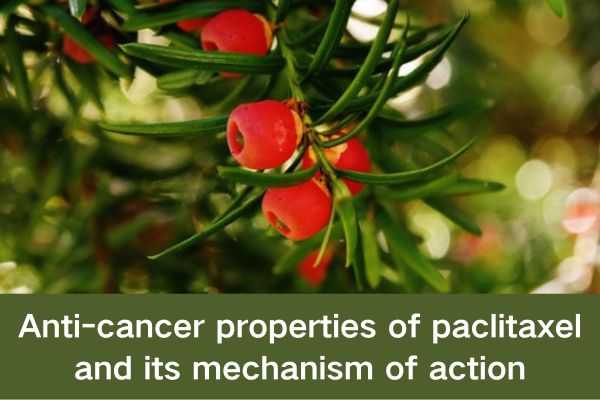Paclitaxel, a natural product derived from taxus chinensis, has been playing an important role in the field of anti-cancer since its discovery in the 1970s. Its unique anti-cancer properties and mechanism of action have made paclitaxel a key drug in the treatment of many cancers.
1. Anti-cancer properties of paclitaxel
Paclitaxel has a significant therapeutic effect on a variety of cancers, including ovarian, breast, lung, esophageal, and gastric cancers.
1, inhibit cell division: paclitaxel can inhibit the polymerization of tubulin, resulting in the formation of spindle during cell division, thus effectively inhibiting the proliferation of tumor cells.
2, induce apoptosis: paclitaxel can trigger the apoptosis process of tumor cells, which is one of the important mechanisms of its anti-cancer effect.
3, enhance chemotherapy sensitivity: paclitaxel is often used in combination with other chemotherapy drugs, which can significantly improve the efficacy of these drugs and enhance the overall anti-cancer effect.
4, inhibit tumor angiogenesis: paclitaxel can also inhibit the formation of tumor blood vessels, cut off the nutrient supply of tumor cells, thus inhibiting tumor growth.
Second, the mechanism of paclitaxel
1, inhibition of tubulin: microtubules are important structural components in cells and participate in the cell division process. Paclitaxel inhibits the proliferation of tumor cells by inhibiting the polymerization of tubulin and preventing the formation of spindles, thereby preventing cell division.
2, activate the apoptotic signal: paclitaxel can activate the apoptotic signal of tumor cells, trigger the apoptosis process inside the cell, resulting in the self-death of tumor cells.
3, regulate gene expression: paclitaxel can also regulate the expression of certain genes in tumor cells, such as P53 gene, etc. These genes play an important role in the occurrence and development of tumors.
4. Inhibit tumor angiogenesis: By inhibiting the expression of vascular endothelial growth factor and other angiogenesis related factors, paclitaxel can inhibit the formation of tumor blood vessels, cut off the nutrient supply of tumors, and thus inhibit tumor growth.
Overall, the anti-cancer properties and mechanisms of action of paclitaxel make it play an important role in cancer treatment. However, the complexity of cancer makes it often difficult for a single drug to completely cure cancer. Therefore, in-depth study of the mechanism of paclitaxel, explore the combined application with other drugs, improve the therapeutic effect, is an important direction of future research. At the same time, with the development of emerging technologies such as genomics, proteomics and immunotherapy, we are expected to develop more efficient and less toxic anti-cancer drugs, bringing better treatment options to cancer patients.
Note: The potential benefits and applications presented in this article are derived from the published literature.
Post time: Jan-23-2024
